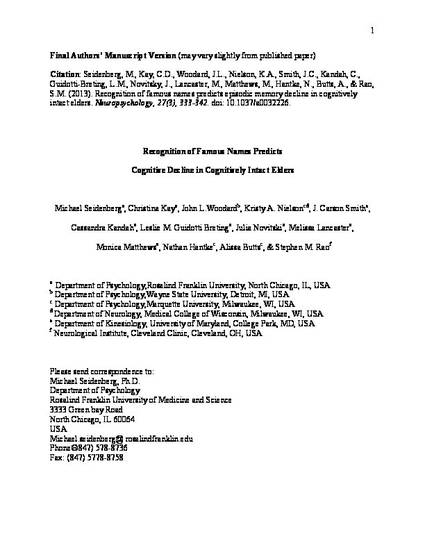
Objective: The ability to recognize familiar people is impaired in both Mild Cognitive Impairment (MCI) and Alzheimer’s Dementia (AD). In addition, both groups often demonstrate a time-limited temporal gradient (TG) in which well known people from decades earlier are better recalled than those learned recently. In this study, we examined the TG in cognitively intact elders for remote famous names (1950–1965) compared to more recent famous names (1995–2005). We hypothesized that the TG pattern on a famous name recognition task (FNRT) would predict future cognitive decline, and also show a significant correlation with hippocampal volume.
Method: Seventy-eight healthy elders (ages 65–90) with age-appropriate cognitive functioning at baseline were administered a FNRT. Follow-up testing 18 months later produced two groups: Declining (≥ 1 SD reduction on at least one of three measures) and Stable (< 1 SD).
Results: The Declining group (N = 27) recognized fewer recent famous names than the Stable group (N = 51), although recognition for remote names was comparable. Baseline MRI volumes for both the left and right hippocampi were significantly smaller in the Declining group than the Stable group. Smaller baseline hippocampal volume was also significantly correlated with poorer performance for recent, but not remote famous names. Logistic regression analyses indicated that baseline TG performance was a significant predictor of group status (Declining vs. Stable) independent of chronological age and APOE ε4 inheritance.
Conclusions: The TG for famous name recognition may serve as an early preclinical cognitive marker of cognitive decline in healthy older individuals
Available at: http://works.bepress.com/kristy_nielson/30/

Accepted version. Neuropsychology, Vol. 27, No. 3 (May 2013): 333-342. DOI. © 2013 American Psychological Association. Used with permission.
This article may not exactly replicate the final version published in the APA journal. It is not the copy of record.